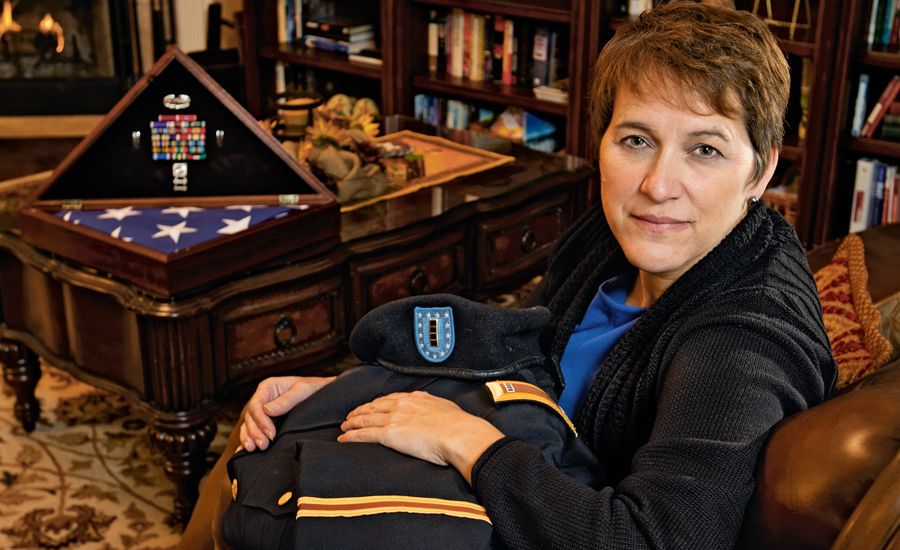I jumped when the phone rang at my desk at Fort Lee. That February, 2007, my son, Pat, was in Iraq, a second lieutenant in the Army. My first instinct was to fear the worst. I couldn’t help it. It’s a fear that haunts most military families.
“I’m calling from the Pentagon,” a woman said. My hand gripped the receiver. I knew this wasn’t how the military would notify me if Pat was dead or wounded. Still, I was scared. Nine months earlier a bomb had killed my husband, John, in Iraq. I was supposed to be moving on with my life but it didn’t feel like I was. Not since the morning two Army officers knocked on my door.
I’d sold that house in West Virginia a month after John was killed, and moved here to Fort Lee, Virginia. I started an internship on the base, training to be a logistics specialist—the same kind of work that John had done in the Army. That was the plan we’d worked out together. He was going to retire when he got home and cheer me on in my new career. I’d just graduated from college. It seemed perfect, as if God was giving us the green light. If only.
There were so many days now that I just sat at this desk and sobbed. I could sense my coworkers turning away, not knowing what to say. I didn’t belong here. I didn’t care about logistics anymore, how to get parts to repair a Humvee or a Stryker. That had been John’s passion. It used to be mine too. We’d been a team for 23 years. I felt lost without him, coming home every night to an empty apartment.
All I could think about was that awful day. Those two soldiers standing at attention at my door at six-fifteen on a Monday morning. I sat across from them in the living room. “The secretary of the Army has asked me to express his deep regret…” one of the soldiers, the notification officer, began. I couldn’t focus on what he was saying. My mind was racing. How had John died? Had he suffered? Who was with him? Were there any survivors? When would I be able to see him? What should I do first? John’s paycheck was our only income. How would I pay that month’s mortgage?
But they couldn’t tell me any of that. “I’m sorry, ma’am. I’m not able to give you that information,” the officer repeated over and over again, as he was trained to do. They waited while I woke Nikki, my 20-year-old daughter. “Someone will be in touch with you within twenty-four hours,” the officer told us. Then they left. They seemed nervous, as if they’d been told not to stay any longer than needed.
That afternoon I got an e-mail telling me that John and another soldier had been killed by a roadside bomb that exploded near their Humvee. That was all the information I was given until my casualty-assistance officer, or CAO, showed up, a day late.
He couldn’t answer my questions either. His job was to help me plan John’s funeral. I chose to have it at Arlington National Cemetery, but I didn’t care about picking out John’s coffin or the order of the service. All I wanted to know was when I would be able to see John, to say goodbye.
“I’m sorry,” the CAO said. “That won’t be possible. His wounds—We just don’t think it’s something you’d want to see.”
Who was the Army to decide what was best for me? But there was nothing I could do. The day before the service, at a funeral home near the cemetery, the CAO ushered me to a softly lit room, to a chair beside a flag-draped coffin.
“Stay as long as you’d like,” he said.
I reached out and touched the coffin, hoping somehow I could feel my husband again. All I felt was its cool surface, indifferent to my touch. Indifferent, like the Army itself.
There had never been a time when the Army wasn’t part of our lives. That’s how I’d met John. We were both soldiers, stationed in Germany, working as mechanics. He stood out, a big bear of a man with red hair and a booming voice. So smart. Always patient, always kind. We hit it off right away. A year and a half later we were married.
I left the Army when I got pregnant with Pat, but there was never a question that John would stay on. He loved the military. He excelled at planning. Logistics. No matter the obstacle, everyone knew they could count on John.
He rose through the ranks to become a chief warrant officer. I was proud of him. I made it my mission to help him succeed. Encouraging him. Listening to his ideas, his frustrations. Helping him pack when he was deployed.
The way I saw it, I too was a logistics expert—for our family. Paying the bills, managing expenses, seeing to home repairs, helping the kids with their homework and getting them to school and church activities. That was my responsibility.
“You’re going to be great,” John told me the day I got my degree. He was in Iraq, but he watched me receive my diploma via an internet feed. That was the last time I heard his voice. The next day, he was killed.
I was numb at the service. Days later the CAO came to the house with stacks of forms to sign. He seemed frustrated by my questions. Things that were important to me—like whether I needed a new military ID—weren’t even on his radar. “You don’t need to worry about that right now,” he’d say.
Finally, determined to get some answers, I went to John’s base, Fort Bragg, in North Carolina. I spent three days there. I got information, but I had to ask all the questions. No one ever asked me what I was worried about or suggested that I go to counseling. There was no one to reassure me that I’d be able to get through this. No one, it seemed, had been given that assignment.
A month later I had come here, to Fort Lee, to this desk. There was no reason for me to stay in West Virginia. Nikki was leaving for college. We’d only moved to the state because John had been assigned to work as a liaison with a National Guard unit there.
I’d been so busy finishing my degree I had barely even met the neighbors. Maybe a change of scenery was what I needed. But my grief hadn’t left me. For the first time since John’s death, I went to church. God felt unreachable, remote, like the Army. I didn’t know what God wanted of me. To stop grieving? To move forward? How?
I tried going to counseling at Fort Lee. But it took weeks to get an appointment and I never seemed to be able to see the same therapist. Every time I went I had to tell my story all over again.
Now, on the phone, the woman from the Pentagon said, “We work with a group that presents medals to the children of soldiers who have been killed. Is there a day your family could come?”
I really wasn’t interested in a medal. But for Nikki and Pat—and John—I’d go. “I’d be honored,” I said. A few weeks later, Nikki and I went to the Pentagon. We got there early and I paced outside the conference room where Gen. George Casey, Jr., the Army chief of staff, would be making the presentation.
Pat would be given his medal in Iraq at the same time. I turned and… there was General Casey, his four stars staring out at me. “Oh, hi,” I said. “I mean sir. I mean—” I felt like a private again. I began nervously edging away from him.
“Donna,” he said, as though he’d known me forever. “How are you doing?” His voice held genuine concern, as if at that moment my welfare was the only thing that mattered to him. Was he for real?
I took a deep breath. I was never going to get another chance to talk to someone like this. And if he did care, and I told him the truth, then maybe things would change. “Sir, I’m okay,” I said. “But there are things about this process that have disappointed me.”
I told him everything, how no one seemed able to answer basic questions, how no one had ever talked to me about getting counseling, the difficulties I’d had getting an appointment. How I wasn’t sure what I even wanted out of life anymore. He listened intently, nodding, his eyes never leaving mine.
“You’re not the first family member to tell me this,” he said when I finished. “I’m forming an advisory panel to make recommendations we can act on.”
“Well, good luck with that,” I said, hoping I didn’t sound too disappointed. When in doubt, form a committee. I turned to step away.
“I want you to be on the panel,” General Casey said.
I stopped. I wasn’t about to say no to a general, even as a civilian. In the months that followed, our committee talked with hundreds of people whose loved ones were killed in service to our nation. Hearing their stories I couldn’t help but feel angry all over again. Their frustrations and sorrow were burdens I knew all too well.
But more than that I felt a sense of purpose, a calling, even. This was an enormous challenge, one it felt as if my whole life had prepared me for. In part, it was about getting the right resources where they should be. This knowledge—the experience—that God had given me. He knew where I was needed all along.
Among the many changes our committee achieved was the creation of a new department within the Army called Survivor Outreach Services. SOS coordinators nationwide now work with surviving family members for as long as they’re needed, referring them to doctors and therapists, financial planners and life coaches who can help them begin to find a way forward.
I’m one of the program’s administrators. Our challenges are enormous. But in the end it comes down to logistics, doesn’t it? The logistics of the heart and of the soul.
Download your FREE ebook, True Inspirational Stories: 9 Real Life Stories of Hope & Faith.





